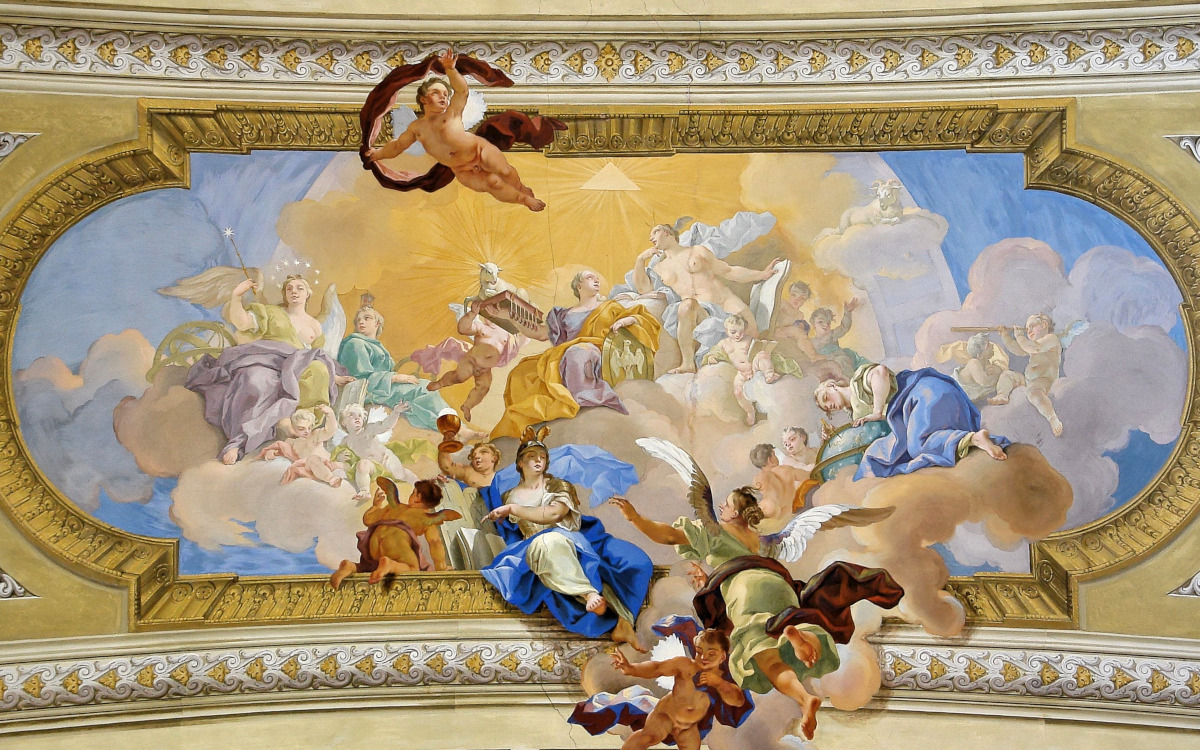Songs and hymns I hate to sing
When I preach for A Rocha, the hymn ‘How great Thou art’ is often chosen. It’s often voted amongst all-time favourites, and verse two makes it an obvious choice for the Christian conservationist:
“When through the woods and forest glades I wander,
And hear the birds sing sweetly in the trees;
When I look down from lofty mountain’s splendour,
And hear the brook and feel the gentle breeze
Then sings my soul, my saviour God to Thee,
How great Thou art, how great Thou art!”
Yet, whilst I love the tune and many of the lyrics, my heart sinks every time I hear the last verse:
‘When Christ shall come with shouts of acclamation,
and take me home what joy shall fill my heart.’
Take me home? Where to? Surely not an airy-fairy ‘heaven’ dreamed up by Victorian painters and revivalist song writers, a ‘home in gloryland that outshines the sun, way beyond the blue horizon’? Listen to these words from the 1911 hymn ‘Anticipation’ by Charles Naylor:
‘When the last earth-tie is sundered, and my soul set free…
But when this short life is o’er, we shall weep and sigh no more,
But rejoice forevermore in our home on high.’
It would be hard to put more bad theology into a hymn if you tried:
- ‘Earth-tie’: a concept owing more to Gnostic heresy that the New Testament
- ‘my soul set free’: the bible never divides soul and body – this is pure Platonic dualism
- ‘our home on high’: NASA’s ‘Curiosity’ Mars rover hasn’t found it, but maybe it’s looking in the wrong place?
Don’t get me wrong! I’ve not stopped believing in heaven. Rather I’ve started to take my theology from the Bible rather than from the hymns I grew up with. And what have I found?
- Heaven is not a place for disembodied souls, but for physical resurrected bodies (1 Corinthians 15).
- The biblical images of God’s new (re-new-ed) creation include abundant wildlife, peaceful societies, and a removal of sin, death and suffering.
- Heaven is not a place in the sky, with clouds, harps and endless bad worship songs. It is wherever God lives. God’s plan is “to bring all things in heaven and on earth together under one head, even Christ” (Ephesians 1:10), so that “God’s home is now among his people” (Revelation 21:3) on a cleansed and renewed creation. More on this next month…
Does it really matter what we sing? Yes it does! Because lyrics and tunes are memorable, they shape our theology more than most sermons. Worship leaders, please think about what you choose and songwriters please read the Bible carefully! Need inspiration? Here’s a genuinely biblical hymn about God’s future for Planet Earth (written by Isaac Watts in 1719):
Joy to the world! The Lord is come;
Let earth receive her King;
Let every heart prepare him room,
And heaven and nature sing.Joy to the world! The Saviour reigns;
Let men their songs employ;
While fields and floods, rocks, hills, and plains
Repeat the sounding joy.No more let sins and sorrows grow,
Nor thorns infest the ground;
He comes to make His blessings flow
Far as the curse is found.He rules the world with truth and grace,
And makes the nations prove
The glories of His righteousness,
And wonders of His love.
We are happy for our blogs to be used by third parties on condition that the author is cited and A Rocha International, arocha.org, is credited as the original source. We would be grateful if you could let us know if you have used our material, by emailing [email protected].




100% agree with what you say…,,, but as an urban misson person… and city environmentalist I struggle with the lines
“When through the woods and forest glades I wander,
And hear the birds sing sweetly in the trees;
and instead sing (with reference to East london)
When through East Ham and Forest Gate I wander,
and smell the curry wafting in the breeze
When I look out from Tower blocks over Hackney
or cycle on the sewer bank that stops disease….
sorry for the doggerel.. but the theology is the same…
A nice piece Dave! I liked the change that was made at our Communicating Hope gathering, when we sang,’When Christ shall come, with shouts of acclamation, and make earth home, what joy shall fill my heart’.
Nice post! Incidentally, there’s a new translation of the hymn behind “How great Thou art” on the Wikipedia page – it’s very effective, and doesn’t have any of the creation-denying escapism that has entered into so many of our hymns and songs.
I agree that worship needs to be based in solid theology, but I don’t think this is where you should’ve picked your argument. There’s several places in scripture, like 2 Corinthians 5 and Philippians 3, that talk about how we long for our home.
Everything else that you wrote I thought you said extremely well and you’re definitely on the right track because there are TONS of songs that just throw out cultural references to heaven or a God that is completely unbiblical.
[…] and hymns I hate to sing Posted on 31 August, 2012 by Dave […]
Dave
I do agree that many have got their theology of heaven from such hymns and are sadly unbiblical. Thanks for pointing this out.
Thanks Greg – as somebody who’s also been rooted in multicultural urban London for the last 20+ years I love your alternative. However, at the same time, I love the signs of wilder nature breaking into our urban spaces too – the Robin singing under the streetlamp, the Fox searching through the rubbish bins, the allotments and trees, and canals. Maybe we need more ‘urban nature’ worship songs!
Thanks Ruth – I meant to include an alternative version for ‘How Great Thou art’, as it is a wonderful hymn otherwise, but I ran out of space – so you’ve done the job beautifully!
BC – thanks for your comment on ‘home’. It’s an important subject. My understanding is that our ‘home’ as Christians is ‘with the Lord’ – ie wherever Jesus is. For St Paul that was a longing to be released from the struggles that he faced, but I believe it was the presence of the Risen Christ rather than an otherworldly place that he longed for. Our call (like Paul’s) is to hold in tension our desire to be ‘at home’ with the Lord, and our mission as co-workers in seeking God’s Kingdom on earth as in heaven – preparing for the day when ‘God’s home will be with mankind’ on a cleansed and restored new earth. More on this next month, and also look out for A Rocha’s 2013 Resource Pack which is going to take the theme of ‘Home’!
Of course… nothing like otters and kingfishers in urban rivers…the Ribble here is Preston.. just outside our house is fantastic.. herons and redshank ..are regular… and we have a great new nature reserve just outside town by the motorway where we volunteer… and this week a special worship service planned… Where is the hymn based on this Rev 22:3? See https://picasaweb.google.com/115402092816272030726/ScripturePosters#5198463819098733730
Dave,
If we understand “take me home” in the hymn in the sense of “take you to be with me” in John 14:3 (NIV)is there still a problem? How do you understand these words of Jesus to the disciples?
One of the verses I have difficulty singing is ‘Changed from glory into glory Till in heaven we take our place’, which I now realise does not reflect Biblical teaching; another is ‘Heaven’s morning breaks and earth’s vain shadows flee’. These are well-loved hymns that most Christians do not think twice about belting out at the tops of their voices. There are several pages on this subject in Tom Wright’s excellent book ‘Surprised by Hope’ (eg p 27-30).
Christine – thanks for the other hymns you mention and the useful remider of ‘Surprised by Hope’.
Peterxyz – good point, and perhaps when he wrote ‘How Great Thou Art’, the hymn writer was thinking of the ‘place prepared for us’ Jesus refers to in John 14. Tom Wright describes this as ‘the waiting room’ – our temporary home before Jesus returns to judge, transform and renew this earthly creation. However, I know from listening to many sermons and conversations that most people singing ‘How Great Thou Art’ picture a disembodied other-worldly home, and hence my plea to song-writers and worship-leaders to be careful what we choose and how we introduce it. If necessary we shouldn’t be afraid to rewrite hymns and songs to be more clearly biblical … after all they’re not holy scripture 🙂
Dave – really enjoyed the post and the comments that have followed. I can still happily sing that Christ will take me home on the basis that the day “when Christ shall come” will emphatically be a form of homecoming, both his and, though him, ours, to a new creation. Admittedly that may not be what many of us have in mind when we sing it!
It has got me thinking about what we mean by “home”. What does the hope of home mean to the refugee, the displaced, the migrant, the landless and the exile? What does it mean for many of us who have little sense of home in spatial/locational sense? I suspect that one of the wonders of God’s new and redeemed creation is that we will find out what it means to be home in the very place where we have never found the fullness of home; where the spatial and relational meanings of home will fully converge and the experience of being the wanderer, sojourner, exile or alien are forgotten memories.
Thanks for your reflection on “home.” You may be interested to know that A Rocha International’s 2013 resource pack is taking the theme of “Home” – reflecting on the tension between being at home ‘in Christ’ in a world that’s largely rejected him, and the calling to put down roots and be home-makers in the locations where God has placed us: being at home in a strange land (Jeremiah 29:4-7)
I know the ‘rogue verse’ 🙂 from How Great Thou Art as we have it in Portuguese, but curiously I’ve just been in Switzerland where that hymn was sung in French in church—two verses only, and no “Christ shall take me home” there. Has that verse been removed there? in the whole country, or just in that congregation? I couldn’t find out.
The Lord gave us a book of His songs–the Psalms–the resources are out there. The Psalms put he word of God in our heart and the theology is good. Songs of man can be unsound.
What about;
The earth shall soon dissolve like snow,
The sun forbear to shine;
But God, who call’d me here below,
Will be forever mine.
I screech to a stop at the last verse … so any alternative words?
Hi Matthew, the verse you quote was the original final verse to John Newton’s “Amazing Grace”, written in 1779. It was based on (a) the assumption that late 18th century conditions were so terrible that Jesus’ return and last judgement were very imminent, and (b) a mis-reading of biblical apocalyptic texts about “the end of the age” full of non-literal symbolic language, and applying them to Christ’s final return. This verse was replaced in the 19th century in virtually all hymn books with a new verse which became universally popular:
“When we’ve been there ten thousand years,
Bright shining as the sun,
We’ve no less days to sing God’s praise,
Than when we first begun.”
It’s a real shame that Chris Tomlin’s recent mash-up of “Amazing Grace / My Chains fell off” has brought back the old discredited verse. The theology of both verses implies that we disappear off to an unearthly heaven (Where exactly is the ‘there’ of ‘When we’ve been there …?), but at least the focus of ‘ten thousand years’ etc is on worshiping God rather than looking for weird and wonderful apocalyptic signs. Perhaps a rewritten version of ‘ten thousand years’ might be a better final verse:
“If we remain ten thousand years,
Or Christ returns as King,
Let’s give our days to sing God’s praise,
The Lord of everything.”
Glad to see a comment on the above, totally opposite of global warming theory, can’t sing it. That explains why I had never heard the verse before.